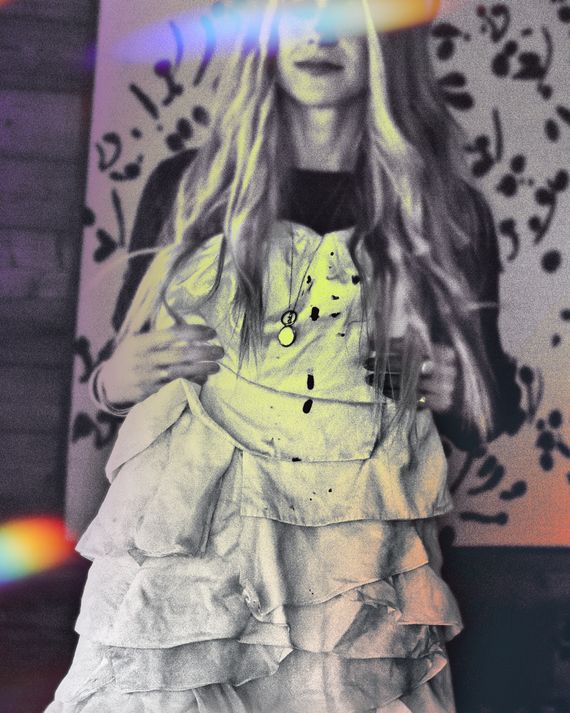
Recently, when I was putting my kids to bed, my younger daughter asked me why I still wear my wedding band on a chain around my neck.
“Well, I designed this ring,” I told her, fluffing the pillow behind her head. “I love it.”
“But you and Daddy are divorced,” she replied, pulling our cat, Harry, all 16 pounds of him, up on the bed and laying her head on his belly. My younger daughter has my features and her father’s freckles. Like both of us, she is blunt and tough but tender.
“Yes. But meeting Daddy was the beginning of becoming a mother. You and your sister are the best things that ever happened to me.”
“Is Daddy the best thing that ever happened to you?”
“No. Daddy is not the best thing that ever happened to me.”
“Why?”
“It’s not a best-and-worst kind of thing.” I tucked the ring, a tiny gold circle, behind my T-shirt. “Meeting Daddy changed everything.”
“You love him, though — right?” My older daughter, her sister, put her graphic novel down then. She is in middle school, and these are the conversations that catch her attention. High drama, high stakes. Love and hate, good and bad, victim and villain.
I find myself at this place often with my daughters. Both wanting to be honest and wanting to deflect. I’m never sure whether it’s better to dodge questions about my marriage or to lean into them. Do I love Daddy? Does it matter? Did it ever?
I launched into a speech about how love is impossible to put into words, how all the great songs of the world are attempts to understand longing and heartache and heartbreak — but both girls yawned. They were bored.
“I’m in love with Harry,” I said finally, scratching our fat cat behind the ears as he let out a meow. “Harry is my soul mate.” We laughed. I turned off the light.
The end started with a photo. Three and a half years after we’d exchanged “I dos,” five years after our first date, the photo appeared on my iPad along with a string of texts between my husband and another woman. The photo was a selfie but not; it was a photo my husband took of himself, not of his face but of a part of his body. The whole thing was so silly — the awkward angles, the awful lighting, the way the messages between them were worded — in any other context, it would have made me laugh. That night, it made me cry.
For the next three years, as I struggled privately to mend my torn marriage, I was, in my public life, the face of all things love and weddings. I ran a bridal showroom, outfitting thousands of people in rings, gowns, and crowns for their big day. When I conceived my business, there was no Instagram, no gluten-free cakes adorned with sprigs of sage, no recently betrothed Kate Moss on the cover of Vogue trailed by tawny flower girls. If you were getting married, most likely, you bought a copy of Martha Stewart Weddings and went to some version of Kleinfeld, where a coiffed salesperson wheeled out a rack of starchy gowns, monstrous with ruffles and crinoline. My goal was to create an easygoing wedding store, a space filled with sun and plants, where the staff wore sneakers, where you could work directly with a mohawked designer on a deconstructed, custom-dyed dress or just buy a slip off the rack and elope to City Hall.
I had no business starting a business; when I met my husband I was writing copy for face-cream containers in midtown. But I was driven by a feeling. I loved the man I married, and I wanted to bottle that feeling up, to offer it to others the way I wish it had been offered to me.
When my ex-husband first reached out to me on Facebook, I was living in the East Village with two cats, one of whom was on Prozac. Most of my friends were married, and I was tired of being the cool aunt, of being the plus-one at the wedding, of being told by my gynecologist that my eggs were about to expire. I had never particularly been good at dating, never understood people who glided in and out of relationships seamlessly, whipping up minivans and mortgages and 401(k)’s along the way. I was still pining over bad-boy types — textbook opposites from my suit-and-tie-clad businessman dad — slightly unwashed and slightly unhinged, a blur of bands, body odor, and tattoos. Mostly, I saw romance as distractions from adulting, vehicles for high drama, high stakes, and drinking. Once I dated a guy who, mid-argument, dangled my kitten out the window. Once a boyfriend asked me to marry him, then peed on my leg in his sleep.
But my ex-husband was different. He showed me how to drive stick in a Long Beach parking lot. He helped me buy a bike off Craigslist. When I discovered mosquitoes flying in through my AC, he rushed over in the middle of the night wearing a headlamp. Once at a Brooklyn bistro, when my salmon arrived with its eyes, head, and tail intact, he fileted the entire carcass without ever breaking eye contact, all the while explaining the saga of Sully Sullenberger. “Careful of the bones,” he said and passed me the fish. I was smitten.
Compared to the Peter Pans that came before, it was everything he was not that I found incredibly appealing. He always wore his seat belt. He never yelled. Given his family history, I knew he would never go bald. When I added this all together, topped with the fact that the same worried gynecologist had recently passed me a pamphlet entitled Risks of Pregnancy Over Thirty, I figured marriage was the next logical step. Around our fifth date, I watched him run into the ocean with a nephew under each arm. Six months later, the wedding date was locked down.
Several times, we met with my rabbi (because he is Irish Catholic and I am Jewish) to discuss things like: to Christmas tree or not to Christmas tree? (No.) Two separate bank accounts or one? (One, but separate savings.) How many days apart a month at most? (Eight.) Everything was in alignment.
“What about monogamy?” asked the rabbi. We were in Mogador, in the East Village. Sunday afternoon. I think Chloë Sevigny was sitting next to us.
“It’s a bold experiment,” my then-fiancé said. We all laughed. Or at least that’s how I remember it now.
Did he really say that, though? Did he then sneak off to the bathroom, wink at some waitress, call her later from his flip phone? This is what keeps me up at night now, sandwiched between my daughters, head pounding, counting down the hours until I can pop another migraine pill. How could I have been so dumb? What else did I miss? How many signs were there from the start?
The past can become a permanent panic attack once you discover the love of your life has been leading a double life.
Three months after launching my bridal business, about a year and a half after the wedding, I had my first baby. It’s all hazy in my mind, tiny moments, sometimes bordering on satire. There was the time, two days after I gave birth, when Allison Williams came to my house for her Girls season-five wedding-dress fitting — I answered the door in my hospital underwear, bleeding and leaking breast milk. Once I sold my nightgown to Sharon Osbourne. Short on cash another time, I sold my own engagement ring to make rent. Still, I loved my job, loved going to work and guiding people through such a strange and sweet transition.
I never intended to be the “face of my business.” Six months in, I joined Instagram, where I learned that the demand for atypical wedding content was huge. The comments grew quickly, and so did the audience. My grid became a series of Valencia-filtered pics of client’s engagement rings with captions detailing their proposal stories. Bohemian brides throughout the ages: Bianca Jagger, 1971, four months pregnant in St. Tropez, plunging white suit and side boob at her wedding to Mick Jagger; Madonna, 1983, in a black bowler hat at her Malibu nuptials to Sean Penn, the words “FUCK OFF” written in the sand to hovering paparazzi.
There was a fig tree by the big bay window in the showroom, and in the summer I’d tie silver streamers to the branches and let the breeze blow in from Soho. Over the years, that tree grew huge on Instagram — as did my baby and my belly. I got pregnant again, appearing on mom blogs and fashion sites, detailing what I wore, what I ate, how many times a week I washed my hair and face and floor.
The business was thriving, and so was I — sort of. The New York Times “Style” section gave the showroom a glowing, full-page review, calling us “the wedding-wear darling of the jammin’ and Instagrammin’ set.” I sold a book called Stone Fox Bride: Love, Lust, and Wedding Planning for the Wild at Heart for more money than I’d ever made in my life. My Instagram followers topped 125,000. I was one of Fast Company’s Most Creative People, I was Domino magazine’s executive weddings editor, and Vogue gave me a weekly online advice column on marriage. Soon I was fielding offers for sponsored content and producing photo shoots and parties for shoes, booze, bras, and perfume.
Here’s what no one saw: the STD test at my six-week sonogram. The evidence of more affairs unfolding, month after month, year after year — in the laundry hamper, on our phone bill, in my DMs. The creams and balms and salves I slathered on before bed, believing it was my fault, that I’d become too baggy, too saggy, too bitchy, too naggy, that if I woke up shiny and taut I’d win his love back.
One night in May, my then-husband returned from a business trip and we barbecued on the patio. It was a balmy night, unusually warm, and as I watched our daughters, 2 and 5, dance to the Moana soundtrack, I felt a deep sense of gratitude. Gratitude for our home, the sweetness of the evening, the pink sun setting over the skyline.
The next morning, a friend texted me a screenshot: She’d just matched with him on a dating app.
It’s a foggy memory. I know our daughters were sleeping. I know the sink was full of dirty dishes. I don’t remember much else, but I have a recurring dream where I watch my ex walk out of our house into a gold field, his wedding band catching the light. He is back lit, silhouetted by the sun, and I am struck by his long strides, the ease of his gait. In this dream, I am standing in the doorway, dazed and confused, surrounded by toys and blocks and kids and crying.
I do know that I told him to leave that morning, to leave and never come back — and he never did.
The divorce was a soap opera. Lawyers, drama, paperwork — the process took years. At the beginning, I kept posting pics of us on Instagram with long captions about how we had consciously uncoupled and were great friends. It was a lie. His absence enraged me daily — especially when it came to the chores around the house he used to take care of. Those mundane tasks made me seethe: learning how to use the barbeque, kill roaches, fold up the stroller. It all seemed impossible and turned me into the cliché scorned ex-wife.
Once, after I spent an hour unsuccessfully trying to jam the comforter inside the duvet cover, I had a meltdown and sent a text saying: “please just die.” Once, during brunch with my mother-in-law, I demanded to know when he was scheduling a vasectomy. For a while, I catfished him on a dating app. As he was leaving my father’s funeral, I announced, “I hope your penis gets frostbite and falls off.”
The kids were confused. The summer he moved out, my younger daughter would vomit at bedtime, waiting for him to come home. My older daughter would wake up crying out, “I want Daddy.” I cried too, tears of sadness and madness. I was furious about the infidelity. It seemed so unfair. Unfair that marriage is not a binding contract. Unfair that he broke a promise. Unfair that this broken promise was my burden to deal with.
For years, I interrogated him — was any of it ever even real? Why bother with a wedding if he never believed in monogamy? But he’d moved on. He had no patience for rehashing the past. Eventually, I started asking the hard questions of myself. Why had I been in such a rush to find a husband? Why did I think in order to become a mother I had to first get married? When did I start mistaking crumbs for the feast? Why didn’t I leave earlier? The trenching took forever. The story of our relationship began to expand, to hold multiple histories inside it, not in hashtags or deep captions but in the real-life space between us. No bad or good, no wrong or right, no victim or villain. Just two people who bumped into each other in the dark of their 30s, dragging baggage around, doing their best with what they were given. I started to feel lucky — despite the fact I had a wretched marriage, my children had a fantastic father. After a while, I could accept him and his complexities completely — he is beautiful and flawed, fallible and full of poetry.
We both said sorry the day we signed our divorce papers. Sorry I didn’t hold on. Sorry I didn’t let go … sorry, sorry, sorry. Sorry is this easy part; I didn’t realize that until I wrote this all down. It’s forgiveness that’s hard.
Last year, I moved to the country. I no longer work in the bridal world — the wedding dresses sit in a big storage box, collecting dust in the garage. My ex lives close by, and we share custody. For a while we could only talk through a mediator. Now sometimes we go through months of fighting and sometimes we get along okay. Always, he shows up 100 percent for our kids. Other parents often remark how engaged and caring he is. He puts notes in their lunches. He braids their hair. He cooks them a homemade meal every night. He gives them space to make mistakes and holds them and guides them and guards them. We celebrate their birthdays together. We have family meetings about the orthodontist and bedtime. Our kids don’t know I’m still angry at him; I imagine I will be forever.
A few weeks ago, our girls played drums and guitar in a local rock show. They’ve become musicians in their own right, in large part because of their dad, a former professional guitarist who’s spent endless hours teaching them how to play Pretenders and Pink Floyd and Bob Dylan. Watching these little people find their voice as the world, big and small, burns around them is nothing short of a miracle. Both of us know this, but we don’t talk about it. We rarely talk about anything, my ex-husband and I. This is best for everyone, and I’ve made peace with that. But it occurred to me during that concert, as we stood on opposite sides of the darkened venue, watching our daughters sing onstage, that in the 15 years we’ve known each other, he is never not nearby. In this way, I suppose he is my home.
It was a beautiful night. He stayed on his side, and I stayed on mine.




